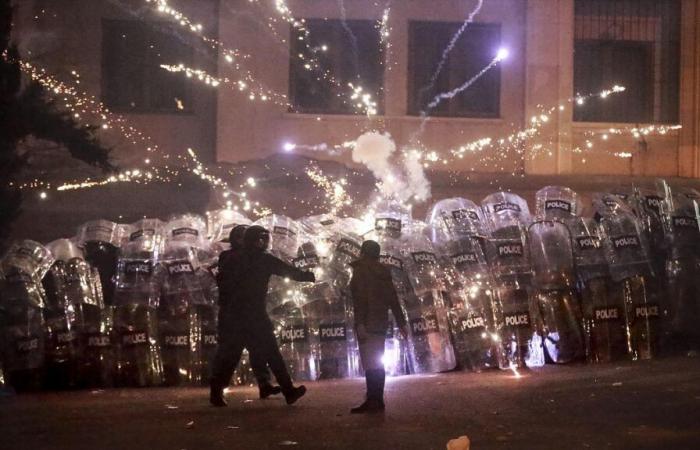At least 43 people have been hospitalized during increasingly violent clashes between police and protesters, according to the country's authorities, as President Salomé Zourabichvili says she will not leave power at the end of her term. .
ADVERTISEMENT
Protests continued for the fourth night in a row in Georgia, following the government's decision to suspend negotiations for accession to the European Union.
According to Georgian authorities, at least 43 people were hospitalized during these increasingly violent protests.
Tens of thousands of demonstrators, most of them gathered in front of Parliament in Tbilisi, the capital, threw stones and fireworks at squads of police.
Police used water cannons, tear gas and pepper spray to try to disperse the crowd.
Prime Minister Irakli Kobakhidze warned that “any offense will be punished to the fullest extent of the law”.
“Politicians who hide in their offices and expose members of their violent groups to severe sanctions will also not escape responsibility”he said during a briefing on Sunday.
However, he insisted that Georgia's European integration had not been canceled.
“The only thing we rejected is the shameful and offensive blackmail, which was a significant obstacle to the European integration of our country”he declares.
Contested legislative elections
The unrest began four days ago, when the government, led by the populist Georgian Dream party, announced it was suspending European Union membership negotiations until at least 2028.
This announcement followed a European Parliament resolution casting doubt on the legitimacy of the legislative elections of October 26which saw the re-election of the Georgian Dream party.
According to the resolution, these elections represented a new manifestation of Georgia’s continued democratic backsliding “for which the ruling party, Georgian Dream, is entirely responsible”.
International observers say they saw cases of violence, corruption and double voting during the poll, prompting some EU lawmakers to demand a new election.
Sunday, Kaja Kallathe new head of EU foreign policy, and Marta Kos, Commissioner for Enlargement, issued a joint statement on the decision to suspend accession negotiations.
“We note that this announcement marks a departure from the policies of all previous Georgian governments and the European aspirations of the vast majority of the Georgian people, as enshrined in the Constitution of Georgia”we can read in the declaration.
The EU granted Georgia candidate status in December 2023 on condition that it complies with the Union's recommendations, but Brussels suspended this process at the beginning of the year after the adoption of a controversial law on “foreign influence”widely seen as a blow to democratic freedoms.
Critics have also accused the Georgian Dream of becoming increasingly authoritarian and moving toward Moscow. The party has recently passed laws similar to those used by the Kremlin to suppress free speech and the rights of LGBTQ+ people.
Separately, Irakli Kobakhidze said President Salomé Zourabivhili was expected to leave her post at the end of her term later this month.
The pro-EU head of state, however, promised to stay in office to support the protesters and says the government “illegitimate” does not have the power to choose his successor.
In an interview given to EuronewsSalomé Zourabichvili declared that the scale of the protests in Georgia was unprecedented, mainly because they extended beyond the political center, Tbilisi.
“Every day there are more people on the streets. And more importantly, real dissent is growing in the country. In state institutions, people are resigning, protesting or signing petitions”she declares.
“We are facing something very new that is also happening geopolitically: Russia, which has not won easily in Ukraine over the last two and a half years, is now trying to fight the European Union with a electoral war”.
“They fought this election war in Georgia and we are fighting it by constitutional means”she adds, in response to allegations of Russian interference in the recent legislative elections.
“They are waging the same electoral war in Romania. And they did it in Moldova. So this is a strategy of Russia”concludes Salomé Zourabichvili.






